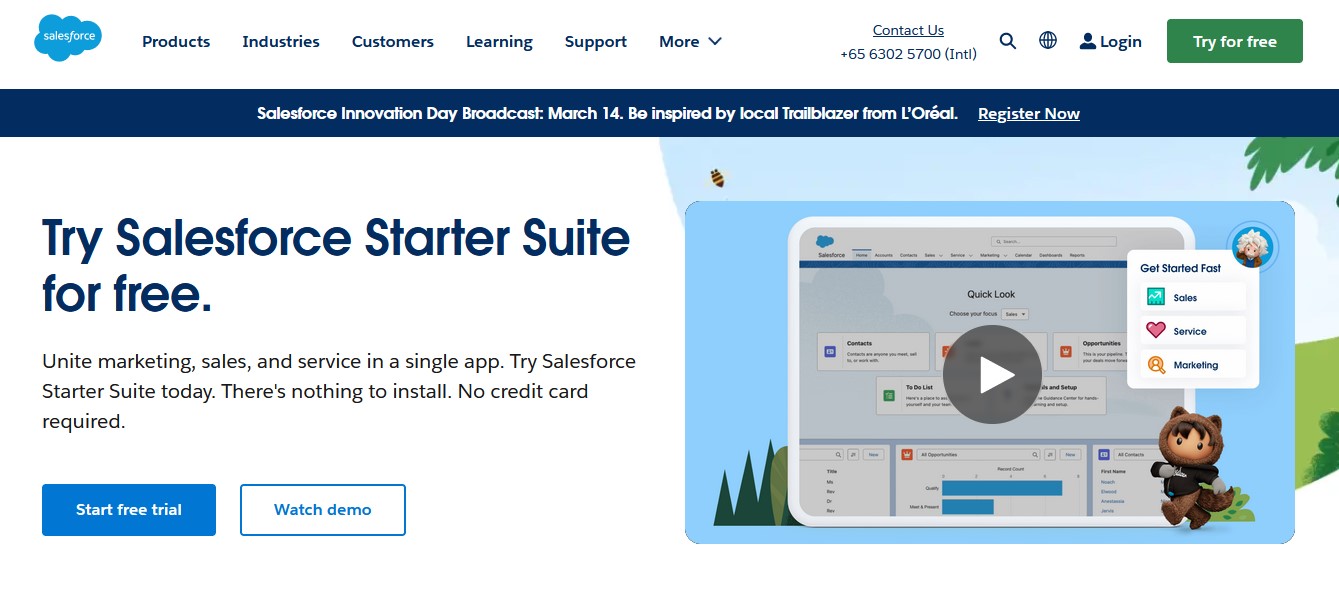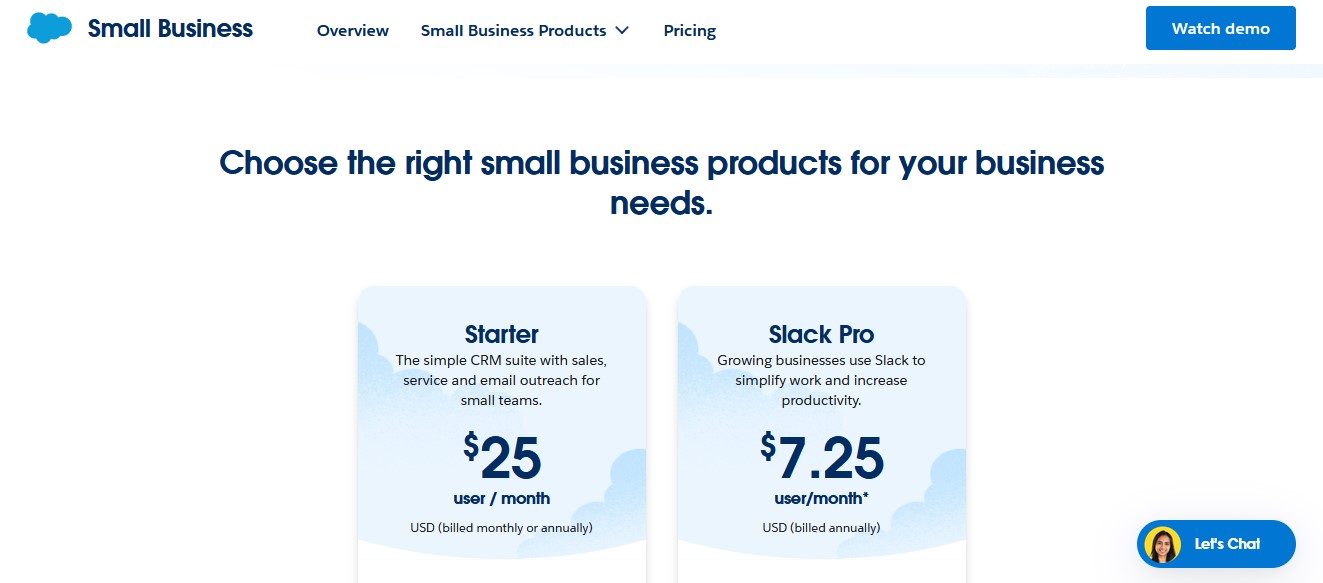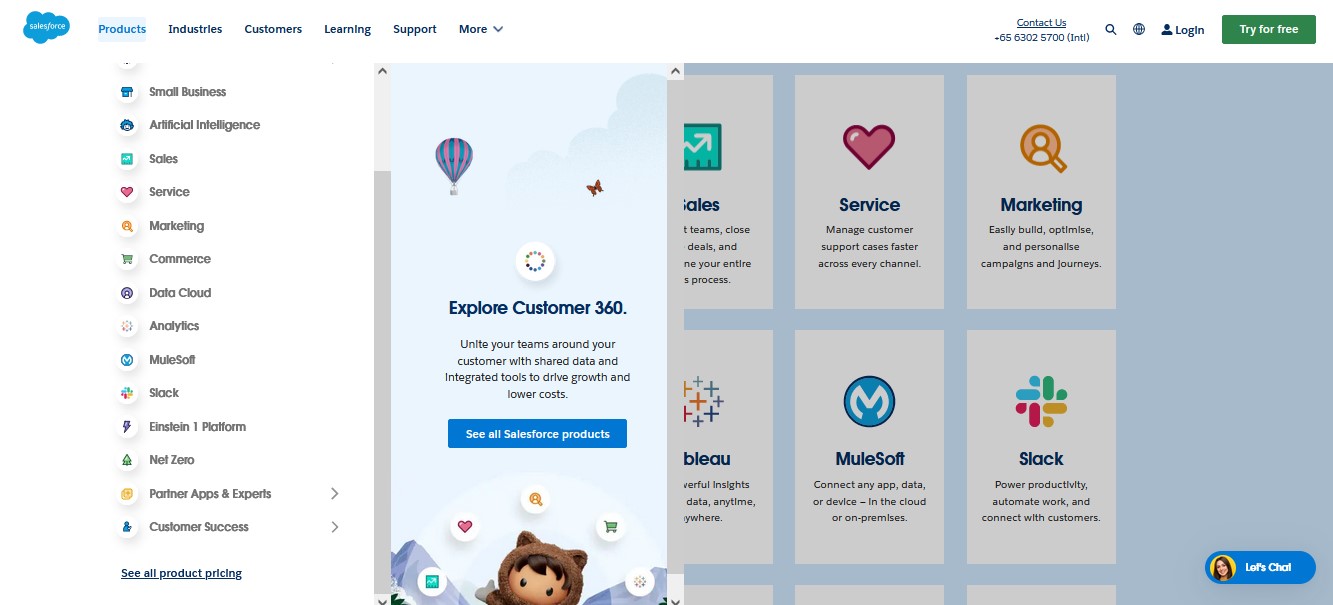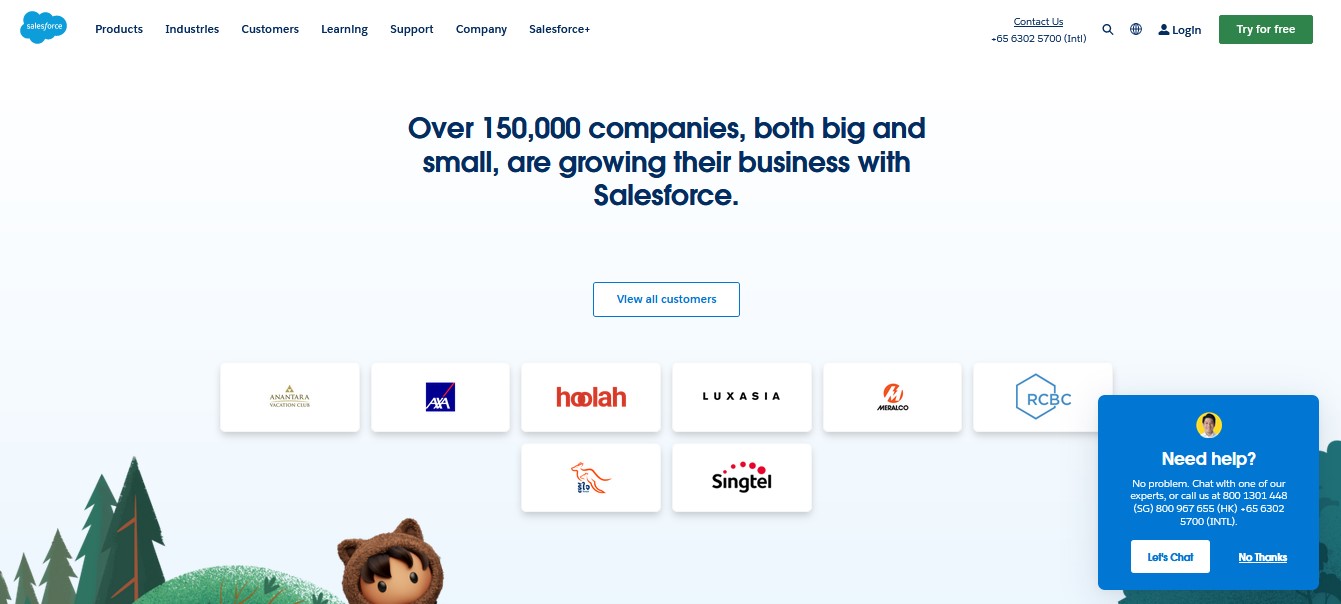Salesforce Sales Cloud is a powerful customer relationship management (CRM) platform that offers various pricing options to cater to businesses of all sizes. The pricing structure includes different tiers such as Essentials, Professional, Enterprise, and Unlimited, with each tier offering a range of features to meet specific business needs. The Essentials package provides basic CRM functionalities at an affordable price point, while the Enterprise and Unlimited packages offer advanced features such as lead scoring, workflow automation, and AI-powered analytics.
In terms of features, Salesforce Sales Cloud is praised for its user-friendly interface and robust capabilities in managing sales processes effectively. Users can track leads and opportunities, manage accounts and contacts, automate tasks through workflows, and gain insights through customizable reports and dashboards. Additionally, Salesforce’s AppExchange marketplace allows users to easily integrate third-party applications to further enhance their CRM experience. Customer reviews of Salesforce Sales Cloud are generally positive, highlighting its scalability, reliability, and extensive customization options.
For businesses looking for alternatives to Salesforce Sales Cloud, there are several CRM platforms available in the market with similar capabilities. Popular alternatives include HubSpot CRM for its ease of use and marketing automation features, Zoho CRM for its affordability and integration options with other Zoho products, and Microsoft Dynamics 365 for its seamless integration with other Microsoft tools like Outlook and Excel.
Overview of Salesforce Sales Cloud
Salesforce Sales Cloud is a powerful customer relationship management (CRM) platform designed to help businesses streamline their sales processes and drive growth. With its robust set of features, Sales Cloud allows organizations to effectively manage leads, opportunities, and customer accounts in one centralized system. By providing real-time insights and analytics, Sales Cloud empowers sales teams to make informed decisions and prioritize their efforts for maximum effectiveness.
One key benefit of Salesforce Sales Cloud is its customizable nature, allowing companies to tailor the platform to meet their specific needs and workflows. Users can create personalized dashboards, reports, and automation rules to automate manual tasks and increase productivity. Additionally, Sales Cloud enables seamless collaboration among team members through features like Chatter, facilitating communication and knowledge sharing across the organization.
In conclusion, Salesforce Sales Cloud serves as a comprehensive solution for businesses looking to enhance their sales operations and drive revenue growth. By leveraging its advanced CRM capabilities and customization options, organizations can improve efficiency, gain deeper insights into their customer data, and ultimately achieve greater success in today’s competitive market landscape.
Salesforce Sales Cloud is a powerful customer relationship management (CRM) platform designed to help businesses streamline their sales processes and drive revenue growth. It offers a wide range of features, including lead management, opportunity tracking, contact management, and forecasting tools. With Sales Cloud, sales teams can easily manage their pipeline, track customer interactions, and collaborate with team members in real-time.
One key feature of Salesforce Sales Cloud is its customizable dashboard that provides a comprehensive view of sales performance metrics and KPIs. This allows sales managers to make data-driven decisions and identify areas for improvement. Additionally, Sales Cloud integrates seamlessly with other Salesforce products and third-party applications, making it easy to scale and customize based on the unique needs of each business. Overall, Salesforce Sales Cloud is a robust CRM solution that empowers sales teams to drive efficiency, productivity, and ultimately increase revenue.
Salesforce Sales Cloud Pricing: Subscription plans and cost breakdown
Salesforce Sales Cloud offers several subscription plans tailored to meet the needs of businesses of all sizes. The pricing for Sales Cloud starts at $25 per user per month for the Essentials plan, which includes basic CRM functionalities such as contact management and task tracking. The next tier is the Professional plan, priced at $75 per user per month, offering more advanced features like opportunity tracking and forecasting. For larger enterprises with complex sales processes, the Enterprise plan at $150 per user per month provides additional customization options and integrations.
It’s important to note that Salesforce also offers a Performance Edition for $300 per user per month, which includes advanced analytics and reporting tools, as well as access to additional Salesforce products like Pardot for marketing automation. Additionally, there may be additional costs for add-ons or customization services depending on your specific business requirements. Overall, Salesforce Sales Cloud provides a range of pricing options to suit different budget constraints and business needs.
Salesforce Sales Cloud is a powerful customer relationship management (CRM) tool that offers various subscription plans to cater to the needs of businesses of all sizes. The pricing for Salesforce Sales Cloud is based on a per user, per month basis, with different tiers available depending on the features and functionalities required. The most basic plan, Essentials, starts at $25 per user per month and includes core CRM functionalities such as contact management and opportunity tracking.
Moving up the tier ladder, the Professional plan costs $75 per user per month and provides additional features like forecasting and collaborative tools. For businesses looking for more advanced capabilities, the Enterprise plan is priced at $150 per user per month and offers automation features, customizable dashboards, and mobile access. At the top end of the spectrum is the Unlimited plan which costs $300 per user per month and includes unlimited support services along with advanced customization options. Overall, Salesforce Sales Cloud’s pricing structure allows businesses to choose a plan that aligns with their specific needs and budget constraints while providing access to cutting-edge CRM technology.
Salesforce Sales Cloud Features: Key functionalities and benefits
Salesforce Sales Cloud is a powerful CRM platform that offers a wide range of key functionalities and benefits for businesses of all sizes. One of the standout features of Sales Cloud is its ability to centralize customer data, making it easy for sales teams to access and manage critical information in one place. This centralized system allows for improved organization and collaboration among team members, leading to more efficient sales processes.
Another key functionality of Salesforce Sales Cloud is its automation capabilities, which help streamline repetitive tasks and workflows. By automating routine activities such as lead scoring, email campaigns, and follow-up reminders, sales teams can focus their time and energy on building relationships and closing deals. Additionally, the advanced reporting tools in Sales Cloud enable businesses to track key performance metrics, analyze trends, and make data-driven decisions to drive revenue growth.
In conclusion, Salesforce Sales Cloud provides businesses with an all-encompassing CRM solution that enhances productivity, efficiency, and overall sales performance. The platform’s robust features such as centralized customer data management, automation capabilities, and advanced reporting tools empower sales teams to work smarter and achieve better results. By leveraging these key functionalities and benefits of Salesforce Sales Cloud effectively, businesses can gain a competitive edge in today’s fast-paced market environment.
Salesforce Sales Cloud offers a range of key functionalities that help businesses streamline their sales processes and drive revenue growth. Some of the key features include lead and opportunity management, contact management, sales forecasting, and workflow automation. These functionalities allow sales teams to track leads effectively, manage customer interactions efficiently, forecast sales accurately, and automate repetitive tasks to increase productivity.
One of the main benefits of Salesforce Sales Cloud is its ability to provide a comprehensive view of the sales pipeline and customer data in real-time. This helps sales teams make informed decisions and prioritize their efforts based on actual data rather than guesswork. Additionally, the platform offers customizable dashboards and reports that enable users to analyze performance metrics and identify areas for improvement. Overall, Salesforce Sales Cloud empowers businesses to drive sales growth, improve customer relationships, and enhance overall efficiency in their sales operations.
Salesforce Sales Cloud Reviews: Customer feedback and satisfaction ratings
Salesforce Sales Cloud has garnered positive reviews from customers, with many praising its user-friendly interface and robust features. Customers appreciate the ease of customization and scalability of the platform, allowing them to tailor it to their specific business needs. The seamless integration with other Salesforce products and third-party applications also adds value to users looking for a comprehensive sales solution.
In terms of customer satisfaction ratings, Salesforce Sales Cloud consistently receives high marks for its customer support and training resources. Users report quick response times from the support team and helpful guidance in resolving any issues that may arise. Overall, the positive feedback from customers underscores Salesforce Sales Cloud’s reputation as a reliable and effective sales tool for businesses of all sizes.
Salesforce Sales Cloud has been a game-changer for businesses looking to streamline their sales processes and improve customer relationships through its comprehensive CRM features. As I delved into researching customer feedback and satisfaction ratings for Salesforce Sales Cloud, I was amazed by the overwhelming positivity expressed by users. Many customers highlighted the platform’s user-friendly interface, robust functionalities, and seamless integration with other tools as key strengths that have transformed their sales operations for the better.
The ability to track leads, manage contacts, analyze sales data, and automate workflows within Salesforce Sales Cloud has garnered high praise from users across various industries. Not only does it provide a centralized hub for all customer interactions, but it also offers valuable insights that help businesses make informed decisions and drive revenue growth. Reading through reviews detailing how Salesforce Sales Cloud has boosted team productivity, increased deal closures, and enhanced overall efficiency left me convinced of its immense value in today’s competitive market landscape. The consistently positive feedback serves as a testament to the platform’s effectiveness in empowering companies to build lasting customer relationships while driving business success through data-driven strategies powered by CRM technology.
Salesforce Sales Cloud Alternatives: Comparison with other CRM solutions
As businesses continue to seek efficient ways to manage customer relationships and drive sales, the landscape of CRM solutions has expanded beyond Salesforce Sales Cloud. One alternative that stands out is HubSpot CRM, known for its user-friendly interface and robust marketing automation features. HubSpot offers a seamless integration between marketing, sales, and customer service functions, providing a comprehensive view of the customer journey. Additionally, its pricing structure is more flexible compared to Salesforce Sales Cloud, making it an attractive option for startups and small businesses looking to scale their operations.
Another notable CRM solution competing with Salesforce Sales Cloud is Zoho CRM. Zoho’s platform offers a wide range of customizable features tailored to various industries and business sizes. With tools for lead management, pipeline tracking, and analytics reporting, Zoho CRM empowers businesses to streamline their sales processes effectively. Moreover, Zoho’s affordability makes it a cost-effective alternative for organizations seeking advanced CRM capabilities without breaking the bank. In comparing these alternatives with Salesforce Sales Cloud, businesses must consider factors such as scalability, integration capabilities with existing systems, and overall user experience to determine the best fit for their specific needs.
Salesforce Sales Cloud Integration: Compatibility with third-party tools
Integrating Salesforce Sales Cloud with third-party tools has become increasingly important in the realm of customer relationship management (CRM). The ability to seamlessly connect Sales Cloud with other software applications allows businesses to create a more comprehensive and efficient system for managing customer data and interactions. One of the key benefits of integrating Sales Cloud with third-party tools is the ability to streamline processes and eliminate manual data entry, saving time and reducing errors. This integration also enables businesses to access a wider range of functionalities and capabilities beyond what Salesforce alone can offer.
Moreover, compatibility with third-party tools expands the scope of what is possible within Sales Cloud, allowing businesses to tailor their CRM system to meet specific needs and preferences. By integrating Sales Cloud with other software applications like marketing automation tools or e-commerce platforms, businesses can gain deeper insights into customer behavior, automate marketing campaigns, and improve overall sales performance. Furthermore, seamless integration with third-party tools ensures that businesses can leverage the full potential of their CRM system without being limited by siloed data or disjointed workflows. In essence, compatibility with third-party tools enhances the versatility and effectiveness of Salesforce Sales Cloud as a central hub for managing customer relationships and driving business growth.
Conclusion
In conclusion, Salesforce Sales Cloud emerges as a powerhouse in the realm of CRM solutions, offering a robust set of features and functionalities to streamline sales processes and drive business growth. Its pricing model, although on the higher end, is justified by the extensive range of tools it provides for optimizing sales performance. The user-friendly interface and customizable options make it a popular choice among enterprises of all sizes looking to enhance their sales operations.
When considering alternatives to Salesforce Sales Cloud, it’s essential to weigh the specific needs of your organization against the features offered by other CRM platforms. While competitors may offer similar functionalities at lower price points, Salesforce’s reputation for innovation and customer service sets it apart in the market. Ultimately, choosing the right CRM solution is crucial for long-term success, so conducting thorough research and understanding your business requirements will be key in making an informed decision that aligns with your goals.




